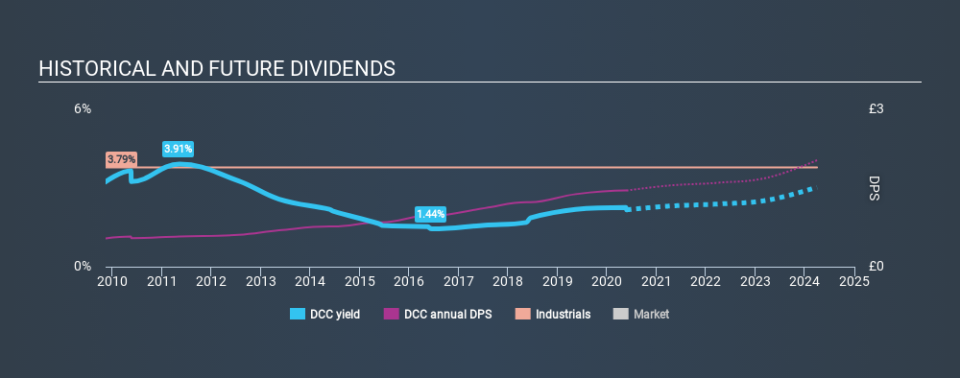Is It Smart To Buy DCC plc (LON:DCC) Before It Goes Ex-Dividend?

Some investors rely on dividends for growing their wealth, and if you're one of those dividend sleuths, you might be intrigued to know that DCC plc (LON:DCC) is about to go ex-dividend in just 2 days. Investors can purchase shares before the 28th of May in order to be eligible for this dividend, which will be paid on the 23rd of July.
DCC's next dividend payment will be UK£0.96 per share, on the back of last year when the company paid a total of UK£1.45 to shareholders. Looking at the last 12 months of distributions, DCC has a trailing yield of approximately 2.2% on its current stock price of £66.94. Dividends are a major contributor to investment returns for long term holders, but only if the dividend continues to be paid. So we need to investigate whether DCC can afford its dividend, and if the dividend could grow.
Check out our latest analysis for DCC
Dividends are typically paid out of company income, so if a company pays out more than it earned, its dividend is usually at a higher risk of being cut. DCC paid out 58% of its earnings to investors last year, a normal payout level for most businesses. Yet cash flows are even more important than profits for assessing a dividend, so we need to see if the company generated enough cash to pay its distribution. It distributed 40% of its free cash flow as dividends, a comfortable payout level for most companies.
It's positive to see that DCC's dividend is covered by both profits and cash flow, since this is generally a sign that the dividend is sustainable, and a lower payout ratio usually suggests a greater margin of safety before the dividend gets cut.
Click here to see the company's payout ratio, plus analyst estimates of its future dividends.
Have Earnings And Dividends Been Growing?
Stocks in companies that generate sustainable earnings growth often make the best dividend prospects, as it is easier to lift the dividend when earnings are rising. If earnings decline and the company is forced to cut its dividend, investors could watch the value of their investment go up in smoke. For this reason, we're glad to see DCC's earnings per share have risen 10% per annum over the last five years. DCC has an average payout ratio which suggests a balance between growing earnings and rewarding shareholders. Given the quick rate of earnings per share growth and current level of payout, there may be a chance of further dividend increases in the future.
Many investors will assess a company's dividend performance by evaluating how much the dividend payments have changed over time. In the last ten years, DCC has lifted its dividend by approximately 10% a year on average. It's great to see earnings per share growing rapidly over several years, and dividends per share growing right along with it.
The Bottom Line
Should investors buy DCC for the upcoming dividend? We like DCC's growing earnings per share and the fact that - while its payout ratio is around average - it paid out a lower percentage of its cash flow. DCC looks solid on this analysis overall, and we'd definitely consider investigating it more closely.
In light of that, while DCC has an appealing dividend, it's worth knowing the risks involved with this stock. Case in point: We've spotted 2 warning signs for DCC you should be aware of.
We wouldn't recommend just buying the first dividend stock you see, though. Here's a list of interesting dividend stocks with a greater than 2% yield and an upcoming dividend.
Love or hate this article? Concerned about the content? Get in touch with us directly. Alternatively, email editorial-team@simplywallst.com.
This article by Simply Wall St is general in nature. It does not constitute a recommendation to buy or sell any stock, and does not take account of your objectives, or your financial situation. We aim to bring you long-term focused analysis driven by fundamental data. Note that our analysis may not factor in the latest price-sensitive company announcements or qualitative material. Simply Wall St has no position in any stocks mentioned. Thank you for reading.



